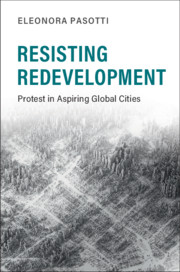Book contents
- Resisting Redevelopment
- Cambridge Studies in Contentious Politics
- Resisting Redevelopment
- Copyright page
- Dedication
- Contents
- Illustrations
- Acknowledgments
- Part I Setting the Comparison
- 1 Introduction
- 2 Explaining Protest against Urban Redevelopment
- 3 Research Design and Overview of Results
- 4 Aspiring Global Cities
- Part II Explaining Mobilization
- Part III Explaining Impact
- Book part
- Bibliography
- Index
- Cambridge Studies in Contentious Politics
3 - Research Design and Overview of Results
from Part I - Setting the Comparison
Published online by Cambridge University Press: 09 March 2020
- Resisting Redevelopment
- Cambridge Studies in Contentious Politics
- Resisting Redevelopment
- Copyright page
- Dedication
- Contents
- Illustrations
- Acknowledgments
- Part I Setting the Comparison
- 1 Introduction
- 2 Explaining Protest against Urban Redevelopment
- 3 Research Design and Overview of Results
- 4 Aspiring Global Cities
- Part II Explaining Mobilization
- Part III Explaining Impact
- Book part
- Bibliography
- Index
- Cambridge Studies in Contentious Politics
Summary
This chapter explains the research design and presents an overview of the results with discussion and flow charts. When are residents able to mobilize against displacement? And when is their mobilization able to affect policy? To answer these questions, the book explores protest in “aspiring global cities” – cities characterized by urban governments that make economic competitiveness their priority. Starting with an analysis of globalization indexes, and with a rigorous selection mechanism, the chapter presents twenty-nine protest campaigns between 2005 and 2015 in Buenos Aires, Hamburg, Istanbul, Los Angeles, Madrid, Melbourne, Santiago, Seoul, Tel Aviv, and Toronto. The main findings are that successful organizers rely on experiential tools – activities designed to attract participants by offering transformative experiences with the goal of making the protest site the place to be. And when these protesters have allies in city council and competition between local and higher level executives, mobilization has policy impact. The legal system and the variety of capitalism in each country influences the strategies of protest organizers, with important differences between liberal and coordinated market economies.
Keywords
- Type
- Chapter
- Information
- Resisting RedevelopmentProtest in Aspiring Global Cities, pp. 49 - 75Publisher: Cambridge University PressPrint publication year: 2020

